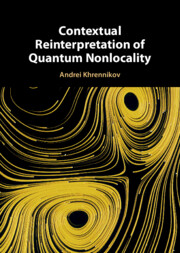Book contents
- Frontmatter
- Dedication
- Contents
- Preface
- Acknowledgments and Recollections
- 1 Introduction to Quantum Measurement Theory
- Part I Quantum Foundations
- 2 Two Faces of Quantum Nonlocality and Two Interpretations of Quantum State
- 3 Bohr’s Principle of Complementarity and Its Contextual Basis
- 4 Information Interpretations of Quantum Mechanics
- 5 Quantum Postulate as the Seed of the Complementarity Principle
- Part II Bell Inequalities
- Part III Contextuality: Mathematical Modeling and Interpretation
- Part IV Contextual Entanglement in Quantum and Classical Physics
- Part V Hertz, Boltzmann, Schrödinger, and de Broglie on Hidden Parameters
- Part VI Further Developments
- References
- Index
2 - Two Faces of Quantum Nonlocality and Two Interpretations of Quantum State
from Part I - Quantum Foundations
Published online by Cambridge University Press: 28 November 2024
- Frontmatter
- Dedication
- Contents
- Preface
- Acknowledgments and Recollections
- 1 Introduction to Quantum Measurement Theory
- Part I Quantum Foundations
- 2 Two Faces of Quantum Nonlocality and Two Interpretations of Quantum State
- 3 Bohr’s Principle of Complementarity and Its Contextual Basis
- 4 Information Interpretations of Quantum Mechanics
- 5 Quantum Postulate as the Seed of the Complementarity Principle
- Part II Bell Inequalities
- Part III Contextuality: Mathematical Modeling and Interpretation
- Part IV Contextual Entanglement in Quantum and Classical Physics
- Part V Hertz, Boltzmann, Schrödinger, and de Broglie on Hidden Parameters
- Part VI Further Developments
- References
- Index
Summary
This chapter is a step towards understanding why quantum nonlocalityis a misleading concept. Metaphorically speaking, quantum nonlocality isJanus faced. One face is an apparent nonlocality of the state update basedon the Luders projection postulate. It can be referred as intrinsic quantumnonlocality. And the other face is subquantumnonlocality: by introducing a special model with hidden variables onederives the Bell inequality and claims that its violation implies the existenceof mysterious instantaneous influences between distant physical systems(Bell nonlocality). According to the Luders projection postulate, aquantum measurement performed on one of the two distant entangled physicalsystems, say on S1, modifies instantaneously the state of S2. Therefore, ifthe quantum state is considered to be an attribute of the individual physicalsystem (Copenhagen interpretation) and if one assumes thatexperimental outcomes are produced in a random way one arrives at the contradiction. It is a primary source of speculation about aspooky action at the distance. But Einstein had already pointed out that the quantum paradoxes disappear, ifone adopts the statistical interpretation.
Keywords
Information
- Type
- Chapter
- Information
- Contextual Reinterpretation of Quantum Nonlocality , pp. 13 - 34Publisher: Cambridge University PressPrint publication year: 2024
